Business Ethics in AMP Limited
VerifiedAdded on 2023/04/25
|7
|2088
|61
AI Summary
This essay discusses the unethical practices of AMP Limited, a financial company in Australia and New Zealand, and the punishment and penalties for financial frauds in Australia. The essay also considers the ethical decision-making processes considering seven moral philosophies.
Contribute Materials
Your contribution can guide someone’s learning journey. Share your
documents today.
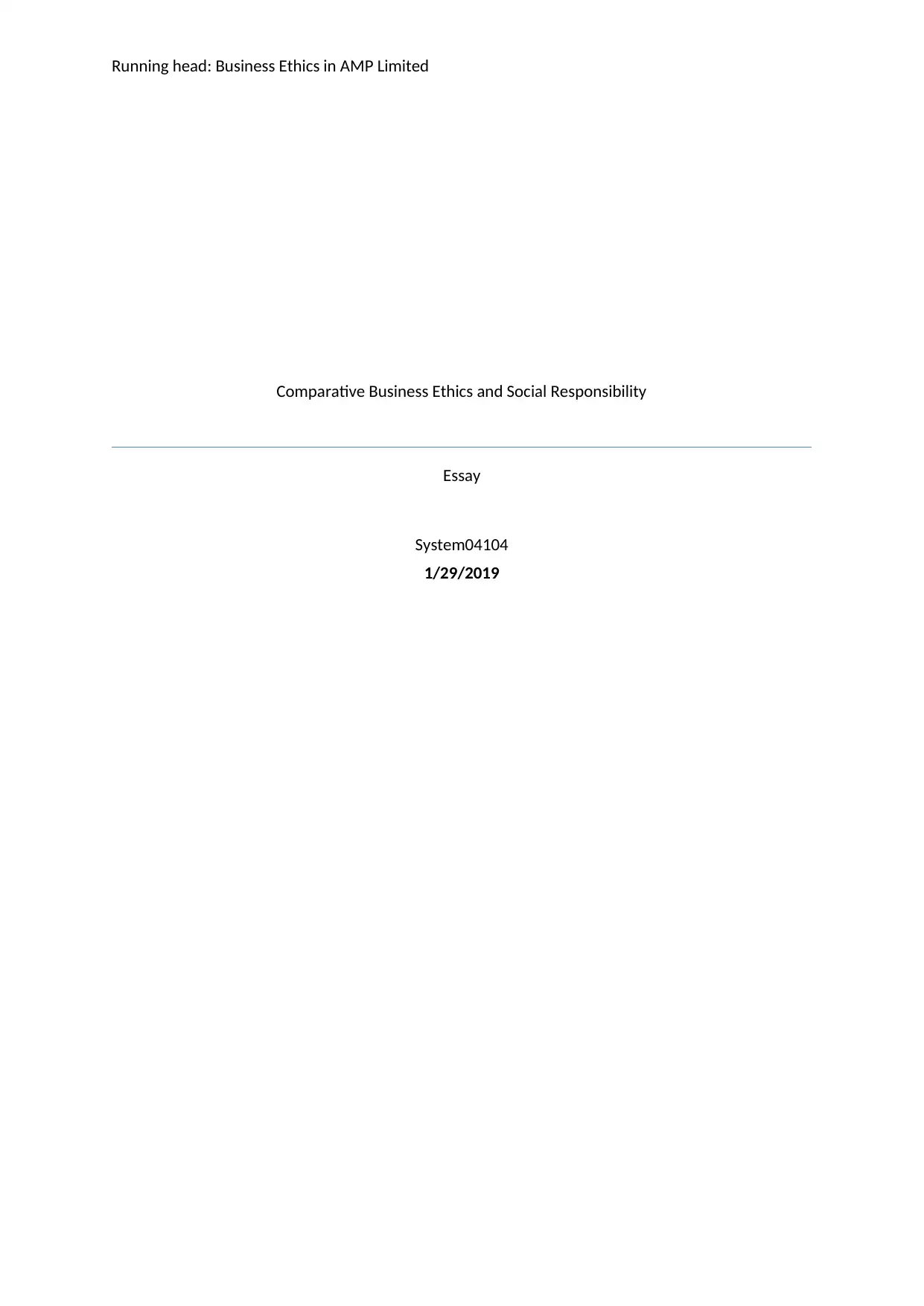
Running head: Business Ethics in AMP Limited
Comparative Business Ethics and Social Responsibility
Essay
System04104
1/29/2019
Comparative Business Ethics and Social Responsibility
Essay
System04104
1/29/2019
Secure Best Marks with AI Grader
Need help grading? Try our AI Grader for instant feedback on your assignments.
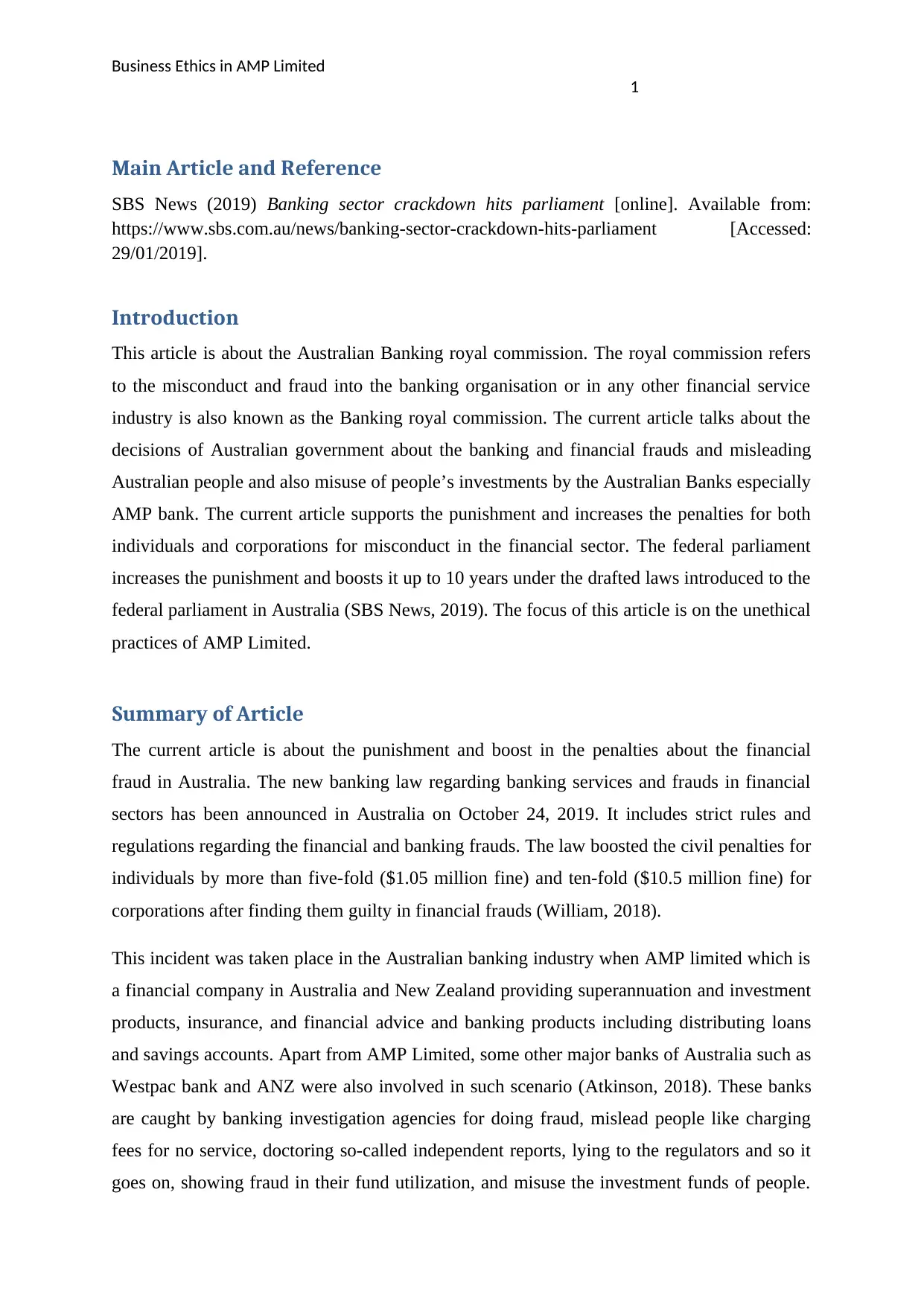
Business Ethics in AMP Limited
1
Main Article and Reference
SBS News (2019) Banking sector crackdown hits parliament [online]. Available from:
https://www.sbs.com.au/news/banking-sector-crackdown-hits-parliament [Accessed:
29/01/2019].
Introduction
This article is about the Australian Banking royal commission. The royal commission refers
to the misconduct and fraud into the banking organisation or in any other financial service
industry is also known as the Banking royal commission. The current article talks about the
decisions of Australian government about the banking and financial frauds and misleading
Australian people and also misuse of people’s investments by the Australian Banks especially
AMP bank. The current article supports the punishment and increases the penalties for both
individuals and corporations for misconduct in the financial sector. The federal parliament
increases the punishment and boosts it up to 10 years under the drafted laws introduced to the
federal parliament in Australia (SBS News, 2019). The focus of this article is on the unethical
practices of AMP Limited.
Summary of Article
The current article is about the punishment and boost in the penalties about the financial
fraud in Australia. The new banking law regarding banking services and frauds in financial
sectors has been announced in Australia on October 24, 2019. It includes strict rules and
regulations regarding the financial and banking frauds. The law boosted the civil penalties for
individuals by more than five-fold ($1.05 million fine) and ten-fold ($10.5 million fine) for
corporations after finding them guilty in financial frauds (William, 2018).
This incident was taken place in the Australian banking industry when AMP limited which is
a financial company in Australia and New Zealand providing superannuation and investment
products, insurance, and financial advice and banking products including distributing loans
and savings accounts. Apart from AMP Limited, some other major banks of Australia such as
Westpac bank and ANZ were also involved in such scenario (Atkinson, 2018). These banks
are caught by banking investigation agencies for doing fraud, mislead people like charging
fees for no service, doctoring so-called independent reports, lying to the regulators and so it
goes on, showing fraud in their fund utilization, and misuse the investment funds of people.
1
Main Article and Reference
SBS News (2019) Banking sector crackdown hits parliament [online]. Available from:
https://www.sbs.com.au/news/banking-sector-crackdown-hits-parliament [Accessed:
29/01/2019].
Introduction
This article is about the Australian Banking royal commission. The royal commission refers
to the misconduct and fraud into the banking organisation or in any other financial service
industry is also known as the Banking royal commission. The current article talks about the
decisions of Australian government about the banking and financial frauds and misleading
Australian people and also misuse of people’s investments by the Australian Banks especially
AMP bank. The current article supports the punishment and increases the penalties for both
individuals and corporations for misconduct in the financial sector. The federal parliament
increases the punishment and boosts it up to 10 years under the drafted laws introduced to the
federal parliament in Australia (SBS News, 2019). The focus of this article is on the unethical
practices of AMP Limited.
Summary of Article
The current article is about the punishment and boost in the penalties about the financial
fraud in Australia. The new banking law regarding banking services and frauds in financial
sectors has been announced in Australia on October 24, 2019. It includes strict rules and
regulations regarding the financial and banking frauds. The law boosted the civil penalties for
individuals by more than five-fold ($1.05 million fine) and ten-fold ($10.5 million fine) for
corporations after finding them guilty in financial frauds (William, 2018).
This incident was taken place in the Australian banking industry when AMP limited which is
a financial company in Australia and New Zealand providing superannuation and investment
products, insurance, and financial advice and banking products including distributing loans
and savings accounts. Apart from AMP Limited, some other major banks of Australia such as
Westpac bank and ANZ were also involved in such scenario (Atkinson, 2018). These banks
are caught by banking investigation agencies for doing fraud, mislead people like charging
fees for no service, doctoring so-called independent reports, lying to the regulators and so it
goes on, showing fraud in their fund utilization, and misuse the investment funds of people.
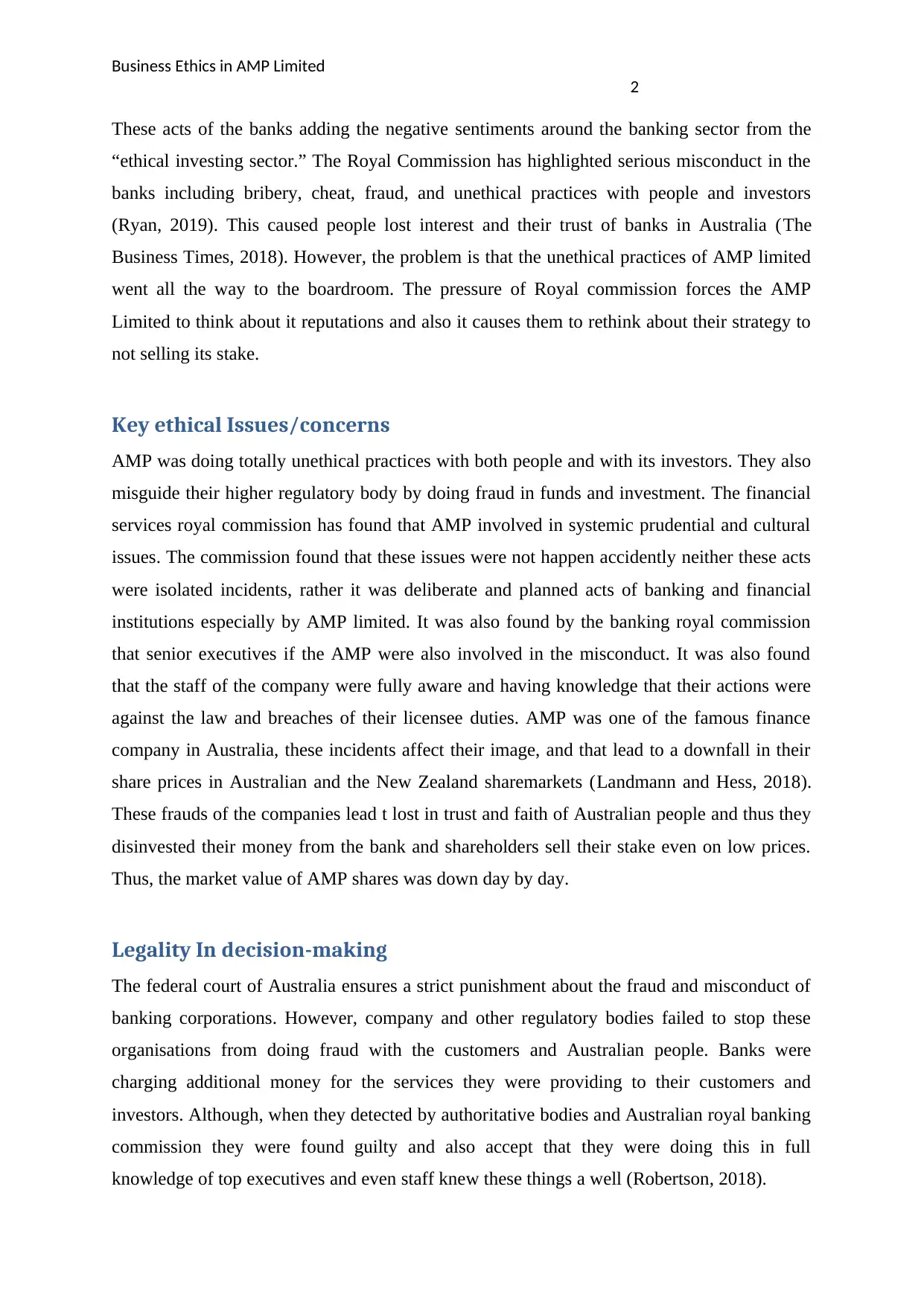
Business Ethics in AMP Limited
2
These acts of the banks adding the negative sentiments around the banking sector from the
“ethical investing sector.” The Royal Commission has highlighted serious misconduct in the
banks including bribery, cheat, fraud, and unethical practices with people and investors
(Ryan, 2019). This caused people lost interest and their trust of banks in Australia (The
Business Times, 2018). However, the problem is that the unethical practices of AMP limited
went all the way to the boardroom. The pressure of Royal commission forces the AMP
Limited to think about it reputations and also it causes them to rethink about their strategy to
not selling its stake.
Key ethical Issues/concerns
AMP was doing totally unethical practices with both people and with its investors. They also
misguide their higher regulatory body by doing fraud in funds and investment. The financial
services royal commission has found that AMP involved in systemic prudential and cultural
issues. The commission found that these issues were not happen accidently neither these acts
were isolated incidents, rather it was deliberate and planned acts of banking and financial
institutions especially by AMP limited. It was also found by the banking royal commission
that senior executives if the AMP were also involved in the misconduct. It was also found
that the staff of the company were fully aware and having knowledge that their actions were
against the law and breaches of their licensee duties. AMP was one of the famous finance
company in Australia, these incidents affect their image, and that lead to a downfall in their
share prices in Australian and the New Zealand sharemarkets (Landmann and Hess, 2018).
These frauds of the companies lead t lost in trust and faith of Australian people and thus they
disinvested their money from the bank and shareholders sell their stake even on low prices.
Thus, the market value of AMP shares was down day by day.
Legality In decision-making
The federal court of Australia ensures a strict punishment about the fraud and misconduct of
banking corporations. However, company and other regulatory bodies failed to stop these
organisations from doing fraud with the customers and Australian people. Banks were
charging additional money for the services they were providing to their customers and
investors. Although, when they detected by authoritative bodies and Australian royal banking
commission they were found guilty and also accept that they were doing this in full
knowledge of top executives and even staff knew these things a well (Robertson, 2018).
2
These acts of the banks adding the negative sentiments around the banking sector from the
“ethical investing sector.” The Royal Commission has highlighted serious misconduct in the
banks including bribery, cheat, fraud, and unethical practices with people and investors
(Ryan, 2019). This caused people lost interest and their trust of banks in Australia (The
Business Times, 2018). However, the problem is that the unethical practices of AMP limited
went all the way to the boardroom. The pressure of Royal commission forces the AMP
Limited to think about it reputations and also it causes them to rethink about their strategy to
not selling its stake.
Key ethical Issues/concerns
AMP was doing totally unethical practices with both people and with its investors. They also
misguide their higher regulatory body by doing fraud in funds and investment. The financial
services royal commission has found that AMP involved in systemic prudential and cultural
issues. The commission found that these issues were not happen accidently neither these acts
were isolated incidents, rather it was deliberate and planned acts of banking and financial
institutions especially by AMP limited. It was also found by the banking royal commission
that senior executives if the AMP were also involved in the misconduct. It was also found
that the staff of the company were fully aware and having knowledge that their actions were
against the law and breaches of their licensee duties. AMP was one of the famous finance
company in Australia, these incidents affect their image, and that lead to a downfall in their
share prices in Australian and the New Zealand sharemarkets (Landmann and Hess, 2018).
These frauds of the companies lead t lost in trust and faith of Australian people and thus they
disinvested their money from the bank and shareholders sell their stake even on low prices.
Thus, the market value of AMP shares was down day by day.
Legality In decision-making
The federal court of Australia ensures a strict punishment about the fraud and misconduct of
banking corporations. However, company and other regulatory bodies failed to stop these
organisations from doing fraud with the customers and Australian people. Banks were
charging additional money for the services they were providing to their customers and
investors. Although, when they detected by authoritative bodies and Australian royal banking
commission they were found guilty and also accept that they were doing this in full
knowledge of top executives and even staff knew these things a well (Robertson, 2018).
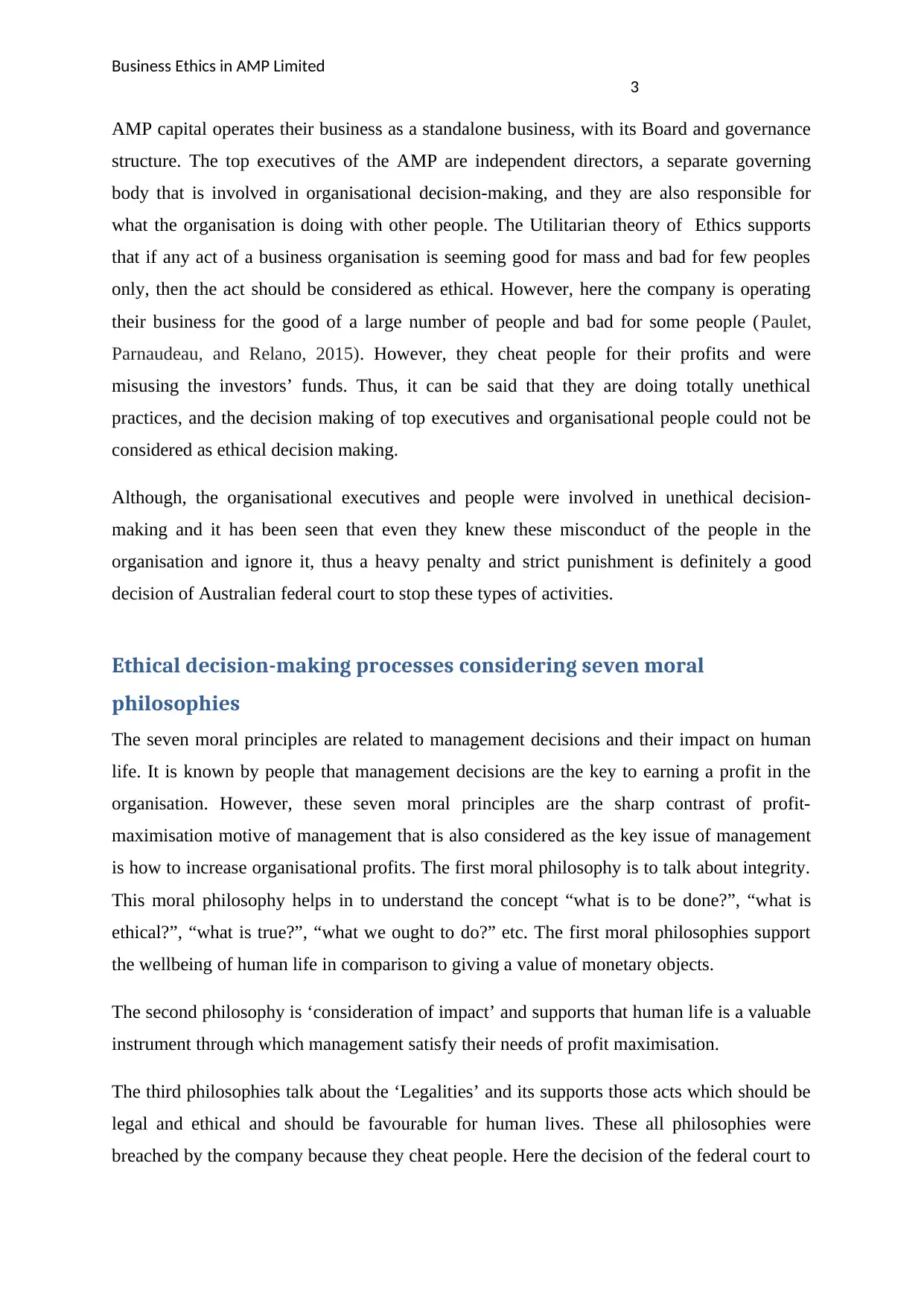
Business Ethics in AMP Limited
3
AMP capital operates their business as a standalone business, with its Board and governance
structure. The top executives of the AMP are independent directors, a separate governing
body that is involved in organisational decision-making, and they are also responsible for
what the organisation is doing with other people. The Utilitarian theory of Ethics supports
that if any act of a business organisation is seeming good for mass and bad for few peoples
only, then the act should be considered as ethical. However, here the company is operating
their business for the good of a large number of people and bad for some people (Paulet,
Parnaudeau, and Relano, 2015). However, they cheat people for their profits and were
misusing the investors’ funds. Thus, it can be said that they are doing totally unethical
practices, and the decision making of top executives and organisational people could not be
considered as ethical decision making.
Although, the organisational executives and people were involved in unethical decision-
making and it has been seen that even they knew these misconduct of the people in the
organisation and ignore it, thus a heavy penalty and strict punishment is definitely a good
decision of Australian federal court to stop these types of activities.
Ethical decision-making processes considering seven moral
philosophies
The seven moral principles are related to management decisions and their impact on human
life. It is known by people that management decisions are the key to earning a profit in the
organisation. However, these seven moral principles are the sharp contrast of profit-
maximisation motive of management that is also considered as the key issue of management
is how to increase organisational profits. The first moral philosophy is to talk about integrity.
This moral philosophy helps in to understand the concept “what is to be done?”, “what is
ethical?”, “what is true?”, “what we ought to do?” etc. The first moral philosophies support
the wellbeing of human life in comparison to giving a value of monetary objects.
The second philosophy is ‘consideration of impact’ and supports that human life is a valuable
instrument through which management satisfy their needs of profit maximisation.
The third philosophies talk about the ‘Legalities’ and its supports those acts which should be
legal and ethical and should be favourable for human lives. These all philosophies were
breached by the company because they cheat people. Here the decision of the federal court to
3
AMP capital operates their business as a standalone business, with its Board and governance
structure. The top executives of the AMP are independent directors, a separate governing
body that is involved in organisational decision-making, and they are also responsible for
what the organisation is doing with other people. The Utilitarian theory of Ethics supports
that if any act of a business organisation is seeming good for mass and bad for few peoples
only, then the act should be considered as ethical. However, here the company is operating
their business for the good of a large number of people and bad for some people (Paulet,
Parnaudeau, and Relano, 2015). However, they cheat people for their profits and were
misusing the investors’ funds. Thus, it can be said that they are doing totally unethical
practices, and the decision making of top executives and organisational people could not be
considered as ethical decision making.
Although, the organisational executives and people were involved in unethical decision-
making and it has been seen that even they knew these misconduct of the people in the
organisation and ignore it, thus a heavy penalty and strict punishment is definitely a good
decision of Australian federal court to stop these types of activities.
Ethical decision-making processes considering seven moral
philosophies
The seven moral principles are related to management decisions and their impact on human
life. It is known by people that management decisions are the key to earning a profit in the
organisation. However, these seven moral principles are the sharp contrast of profit-
maximisation motive of management that is also considered as the key issue of management
is how to increase organisational profits. The first moral philosophy is to talk about integrity.
This moral philosophy helps in to understand the concept “what is to be done?”, “what is
ethical?”, “what is true?”, “what we ought to do?” etc. The first moral philosophies support
the wellbeing of human life in comparison to giving a value of monetary objects.
The second philosophy is ‘consideration of impact’ and supports that human life is a valuable
instrument through which management satisfy their needs of profit maximisation.
The third philosophies talk about the ‘Legalities’ and its supports those acts which should be
legal and ethical and should be favourable for human lives. These all philosophies were
breached by the company because they cheat people. Here the decision of the federal court to
Secure Best Marks with AI Grader
Need help grading? Try our AI Grader for instant feedback on your assignments.
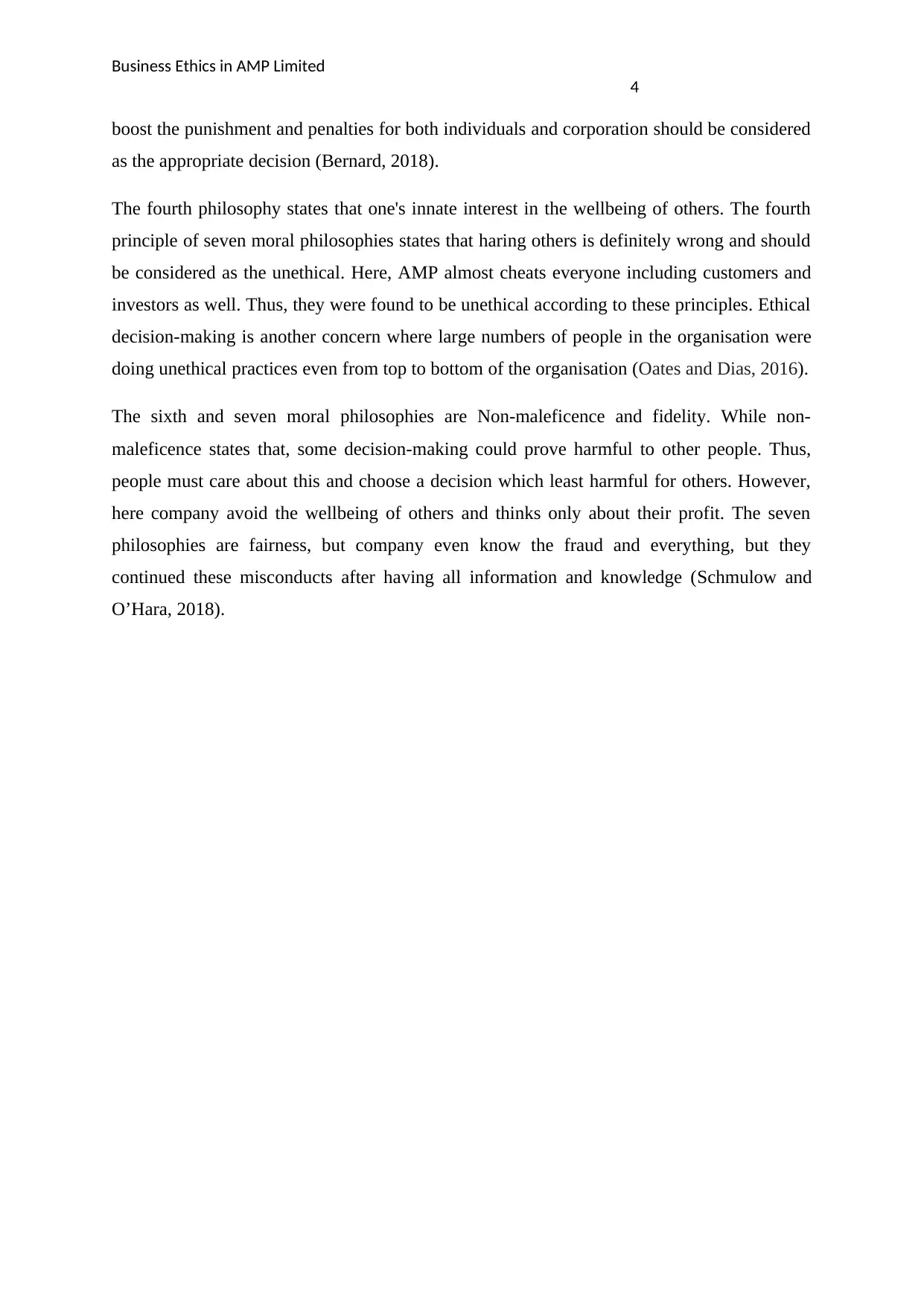
Business Ethics in AMP Limited
4
boost the punishment and penalties for both individuals and corporation should be considered
as the appropriate decision (Bernard, 2018).
The fourth philosophy states that one's innate interest in the wellbeing of others. The fourth
principle of seven moral philosophies states that haring others is definitely wrong and should
be considered as the unethical. Here, AMP almost cheats everyone including customers and
investors as well. Thus, they were found to be unethical according to these principles. Ethical
decision-making is another concern where large numbers of people in the organisation were
doing unethical practices even from top to bottom of the organisation (Oates and Dias, 2016).
The sixth and seven moral philosophies are Non-maleficence and fidelity. While non-
maleficence states that, some decision-making could prove harmful to other people. Thus,
people must care about this and choose a decision which least harmful for others. However,
here company avoid the wellbeing of others and thinks only about their profit. The seven
philosophies are fairness, but company even know the fraud and everything, but they
continued these misconducts after having all information and knowledge (Schmulow and
O’Hara, 2018).
4
boost the punishment and penalties for both individuals and corporation should be considered
as the appropriate decision (Bernard, 2018).
The fourth philosophy states that one's innate interest in the wellbeing of others. The fourth
principle of seven moral philosophies states that haring others is definitely wrong and should
be considered as the unethical. Here, AMP almost cheats everyone including customers and
investors as well. Thus, they were found to be unethical according to these principles. Ethical
decision-making is another concern where large numbers of people in the organisation were
doing unethical practices even from top to bottom of the organisation (Oates and Dias, 2016).
The sixth and seven moral philosophies are Non-maleficence and fidelity. While non-
maleficence states that, some decision-making could prove harmful to other people. Thus,
people must care about this and choose a decision which least harmful for others. However,
here company avoid the wellbeing of others and thinks only about their profit. The seven
philosophies are fairness, but company even know the fraud and everything, but they
continued these misconducts after having all information and knowledge (Schmulow and
O’Hara, 2018).
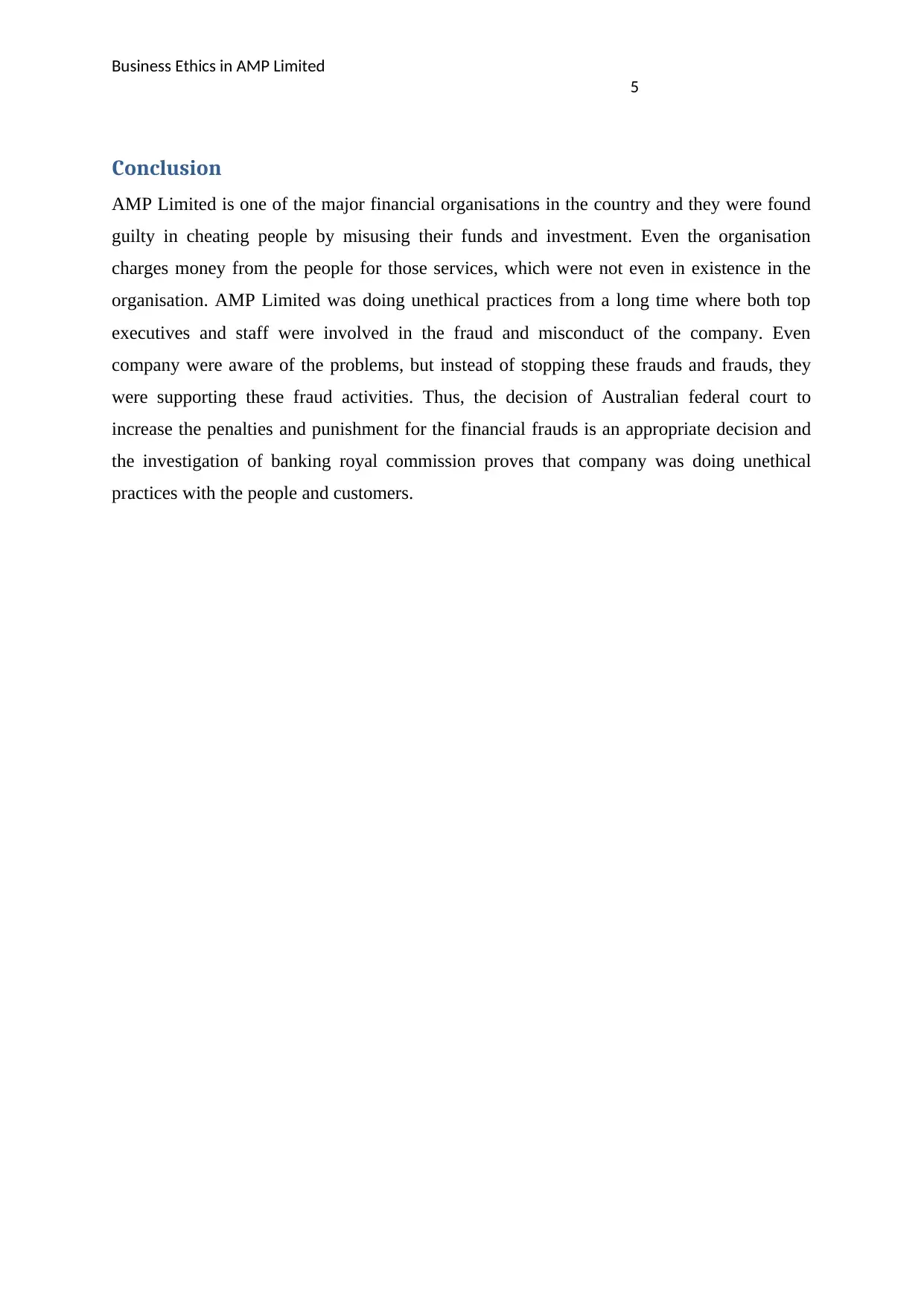
Business Ethics in AMP Limited
5
Conclusion
AMP Limited is one of the major financial organisations in the country and they were found
guilty in cheating people by misusing their funds and investment. Even the organisation
charges money from the people for those services, which were not even in existence in the
organisation. AMP Limited was doing unethical practices from a long time where both top
executives and staff were involved in the fraud and misconduct of the company. Even
company were aware of the problems, but instead of stopping these frauds and frauds, they
were supporting these fraud activities. Thus, the decision of Australian federal court to
increase the penalties and punishment for the financial frauds is an appropriate decision and
the investigation of banking royal commission proves that company was doing unethical
practices with the people and customers.
5
Conclusion
AMP Limited is one of the major financial organisations in the country and they were found
guilty in cheating people by misusing their funds and investment. Even the organisation
charges money from the people for those services, which were not even in existence in the
organisation. AMP Limited was doing unethical practices from a long time where both top
executives and staff were involved in the fraud and misconduct of the company. Even
company were aware of the problems, but instead of stopping these frauds and frauds, they
were supporting these fraud activities. Thus, the decision of Australian federal court to
increase the penalties and punishment for the financial frauds is an appropriate decision and
the investigation of banking royal commission proves that company was doing unethical
practices with the people and customers.
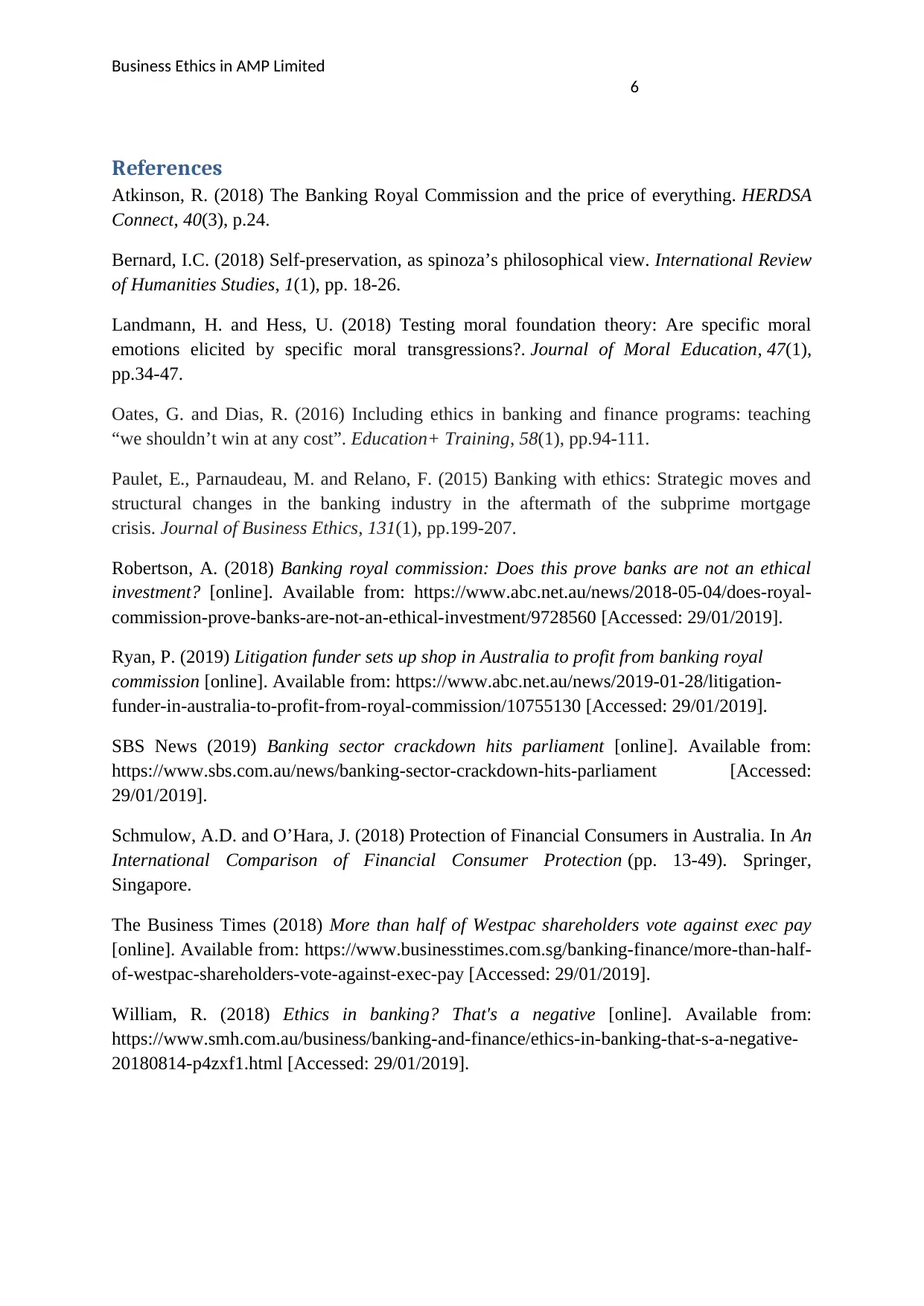
Business Ethics in AMP Limited
6
References
Atkinson, R. (2018) The Banking Royal Commission and the price of everything. HERDSA
Connect, 40(3), p.24.
Bernard, I.C. (2018) Self-preservation, as spinoza’s philosophical view. International Review
of Humanities Studies, 1(1), pp. 18-26.
Landmann, H. and Hess, U. (2018) Testing moral foundation theory: Are specific moral
emotions elicited by specific moral transgressions?. Journal of Moral Education, 47(1),
pp.34-47.
Oates, G. and Dias, R. (2016) Including ethics in banking and finance programs: teaching
“we shouldn’t win at any cost”. Education+ Training, 58(1), pp.94-111.
Paulet, E., Parnaudeau, M. and Relano, F. (2015) Banking with ethics: Strategic moves and
structural changes in the banking industry in the aftermath of the subprime mortgage
crisis. Journal of Business Ethics, 131(1), pp.199-207.
Robertson, A. (2018) Banking royal commission: Does this prove banks are not an ethical
investment? [online]. Available from: https://www.abc.net.au/news/2018-05-04/does-royal-
commission-prove-banks-are-not-an-ethical-investment/9728560 [Accessed: 29/01/2019].
Ryan, P. (2019) Litigation funder sets up shop in Australia to profit from banking royal
commission [online]. Available from: https://www.abc.net.au/news/2019-01-28/litigation-
funder-in-australia-to-profit-from-royal-commission/10755130 [Accessed: 29/01/2019].
SBS News (2019) Banking sector crackdown hits parliament [online]. Available from:
https://www.sbs.com.au/news/banking-sector-crackdown-hits-parliament [Accessed:
29/01/2019].
Schmulow, A.D. and O’Hara, J. (2018) Protection of Financial Consumers in Australia. In An
International Comparison of Financial Consumer Protection (pp. 13-49). Springer,
Singapore.
The Business Times (2018) More than half of Westpac shareholders vote against exec pay
[online]. Available from: https://www.businesstimes.com.sg/banking-finance/more-than-half-
of-westpac-shareholders-vote-against-exec-pay [Accessed: 29/01/2019].
William, R. (2018) Ethics in banking? That's a negative [online]. Available from:
https://www.smh.com.au/business/banking-and-finance/ethics-in-banking-that-s-a-negative-
20180814-p4zxf1.html [Accessed: 29/01/2019].
6
References
Atkinson, R. (2018) The Banking Royal Commission and the price of everything. HERDSA
Connect, 40(3), p.24.
Bernard, I.C. (2018) Self-preservation, as spinoza’s philosophical view. International Review
of Humanities Studies, 1(1), pp. 18-26.
Landmann, H. and Hess, U. (2018) Testing moral foundation theory: Are specific moral
emotions elicited by specific moral transgressions?. Journal of Moral Education, 47(1),
pp.34-47.
Oates, G. and Dias, R. (2016) Including ethics in banking and finance programs: teaching
“we shouldn’t win at any cost”. Education+ Training, 58(1), pp.94-111.
Paulet, E., Parnaudeau, M. and Relano, F. (2015) Banking with ethics: Strategic moves and
structural changes in the banking industry in the aftermath of the subprime mortgage
crisis. Journal of Business Ethics, 131(1), pp.199-207.
Robertson, A. (2018) Banking royal commission: Does this prove banks are not an ethical
investment? [online]. Available from: https://www.abc.net.au/news/2018-05-04/does-royal-
commission-prove-banks-are-not-an-ethical-investment/9728560 [Accessed: 29/01/2019].
Ryan, P. (2019) Litigation funder sets up shop in Australia to profit from banking royal
commission [online]. Available from: https://www.abc.net.au/news/2019-01-28/litigation-
funder-in-australia-to-profit-from-royal-commission/10755130 [Accessed: 29/01/2019].
SBS News (2019) Banking sector crackdown hits parliament [online]. Available from:
https://www.sbs.com.au/news/banking-sector-crackdown-hits-parliament [Accessed:
29/01/2019].
Schmulow, A.D. and O’Hara, J. (2018) Protection of Financial Consumers in Australia. In An
International Comparison of Financial Consumer Protection (pp. 13-49). Springer,
Singapore.
The Business Times (2018) More than half of Westpac shareholders vote against exec pay
[online]. Available from: https://www.businesstimes.com.sg/banking-finance/more-than-half-
of-westpac-shareholders-vote-against-exec-pay [Accessed: 29/01/2019].
William, R. (2018) Ethics in banking? That's a negative [online]. Available from:
https://www.smh.com.au/business/banking-and-finance/ethics-in-banking-that-s-a-negative-
20180814-p4zxf1.html [Accessed: 29/01/2019].
1 out of 7
Related Documents
Your All-in-One AI-Powered Toolkit for Academic Success.
+13062052269
info@desklib.com
Available 24*7 on WhatsApp / Email
![[object Object]](/_next/static/media/star-bottom.7253800d.svg)
Unlock your academic potential
© 2024 | Zucol Services PVT LTD | All rights reserved.





